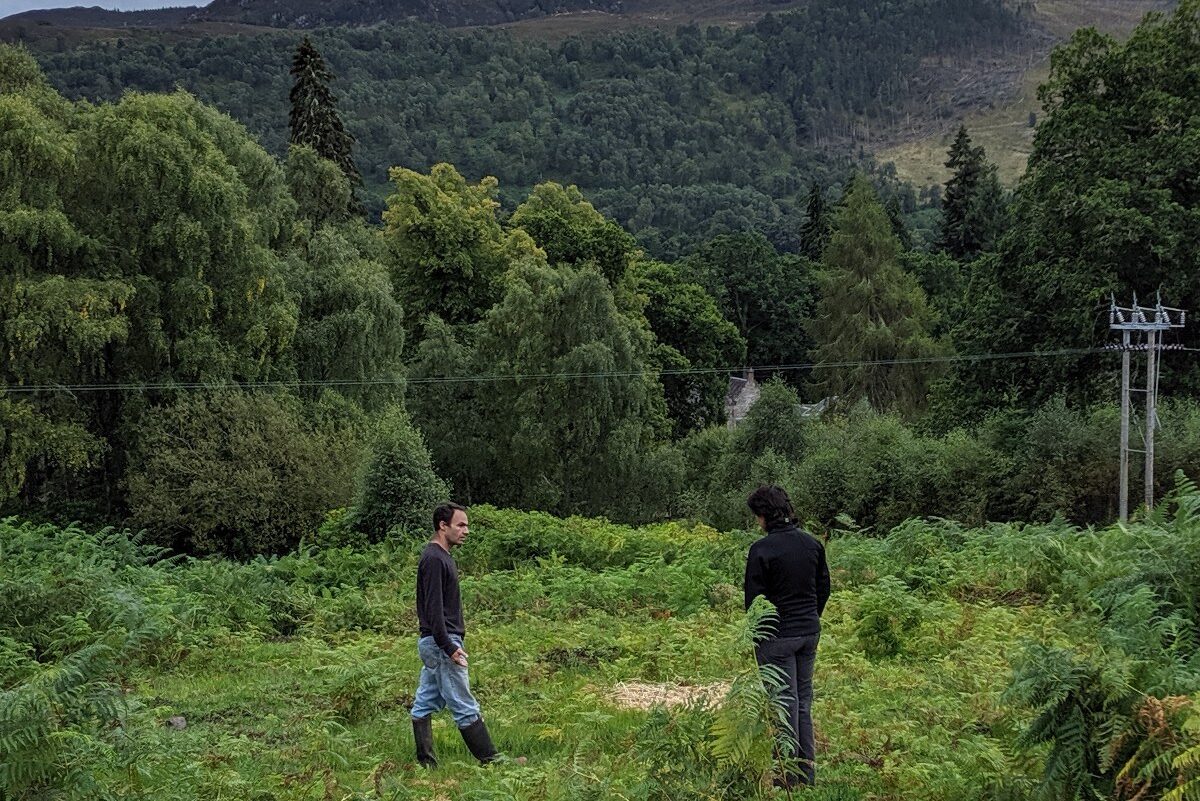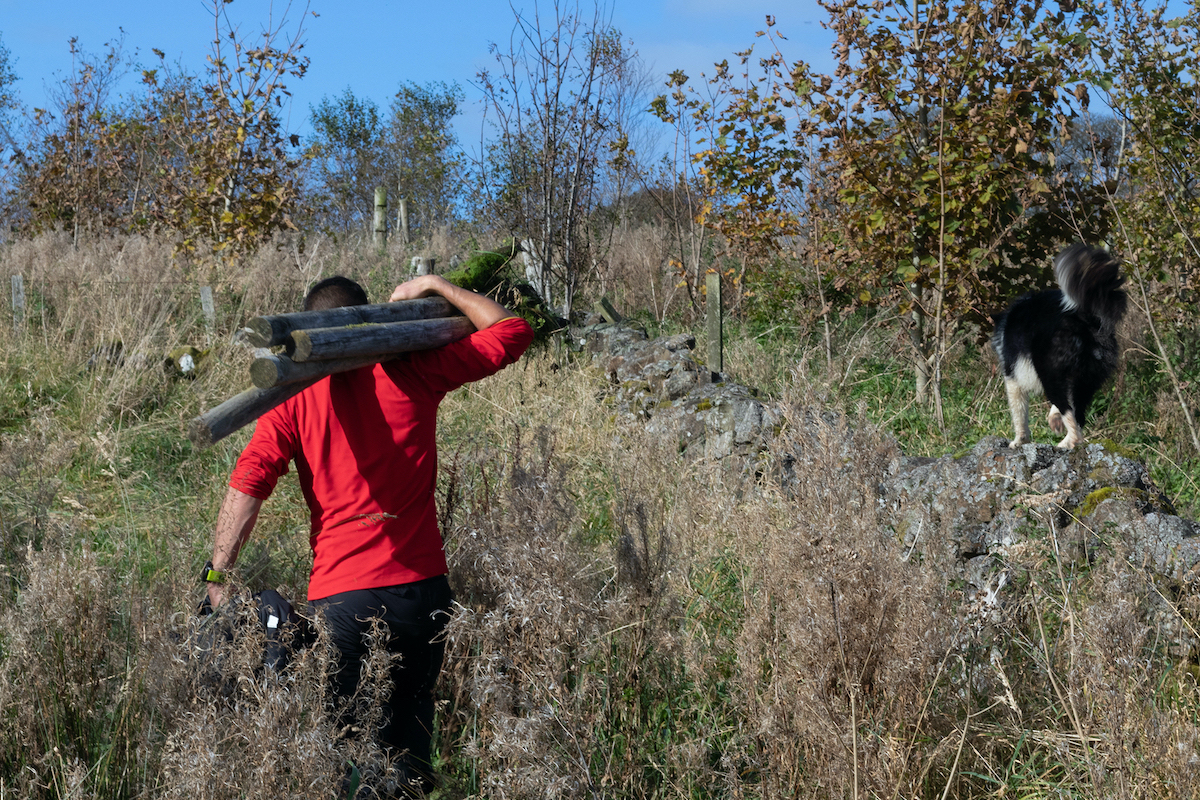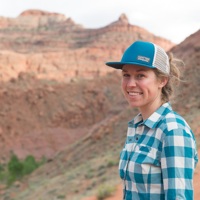What would it be like if you had the option of getting a tree planted in your name instead of a receiving race swag bag filled with a t-shirt you don’t want and other single-use products when you sign up for a race? And what if the global running community adopted this more environmentally friendly approach to the sport?
Turns out, this idea is already set in motion by Trees Not Tees (TNT), a business founded by ultrarunner Jim Mann and biologist Jade Rein that partners with race and event organizers worldwide. To date, TNT has purchased four planting sites in Scotland where the trees are established and protected and will expand with similar U.S.-based reforestation sites in 2022.
But this isn’t just any tree-planting operation. The team scientifically chooses the correct tree species to be planted in each environment, and doesn’t adopt habitats that are already under important use. Many well-intentioned tree-planting companies plant monocultures or plant trees in the wrong place, explains Mann, which dissolves the overall benefits. The organization is also built to scale up, in order to make as big of a positive impact worldwide as possible.
“By being a for-profit and building a model where we can get investment, this allows us to buy a lot more land more quickly and plant trees up front rather than waiting solely for tree sponsorship money to come in. By doing this model rather than a charity, the scale of the positive impact we can have is much greater,” explains Chris Zair, Director of TNT. “If we were not-for-profit, it would be a slow growth curve based on donations.”

Trees Not Tees co-founder Jim Mann surveying a forested area with a co-worker. Photo courtesy of Jim Mann.
Meet Trees Not Tees Co-Founders Jade Rein and Jim Mann
Jade Rein grew up in California, where her family spent weekends hiking, mountaineering, and skiing, which all seeded her love of nature. Raised in the United Kingdom, Jim Mann ran cross country and at 13 years old, got hooked on fell racing. Later, he took a 15-year hiatus from competitive running when he attended Durham University. “I studied ecology. I’ve always been drawn to nature and being outside. I worked in leisure retail and technology after my degree, so it’s really nice to return to working to help restore our broken planet,” says Mann.
He regained footing in fell running and ultrarunning at age 33 via a Bob Graham Round. The mission includes traversing 42 fells across 66 miles in under 24 hours. In 2015, Mann won the Dragon’s Back Race, a multi-day run across the mountains in Wales and a few other ultramarathons. Two years later and all in one season, he became the winter record holder for the three U.K. classic fell running rounds: Bob Graham, Paddy Buckley, and Charlie Ramsay. That same year, he broke Jon Broxap’s then longstanding 24-hour Munros record, which had stood for 27 years, by tagging 30 Munro summits in 22 hours and five minutes. All of this momentum led to a 15th-place finish at the 2018 UTMB.
“As someone who has taken part in lots of running events over the years, I was getting sick of the same old process at every race. Without fail, you’d receive a plastic bag with your bib number, full of single-use plastic, a gel you’d never use, and worst of all, a cheap, brightly colored cotton or polyester t-shirt, whether you wanted it or not,” says Mann and dives into the environmental impact, “Like with the fast-fashion industry, the environmental impact of t-shirt production is devastating, for example using the amount of water a person drinks in 2.5 years to make one shirt. As most of these t-shirts end up in a bottom drawer never worn, or worse, in a landfill, all of those precious resources were for nothing. With this in mind, TNT was a logical solution to bring about change in the event space.”
Today, Mann still runs long and trains most days. He aspires to get back to competing as the world returns to normal but hasn’t raced in two years. “I’m always happiest in the mountains completing long journeys through beautiful places,” he says.
Rein earned a biology degree at the University of Bristol. “My intention was to work in conservation, but I got sidetracked with the technology startup world. I learned how ambitious companies are built and scaled, which shaped my approach to Trees Not Tees and The Future Forest Company. I couldn’t ignore the climate crisis, and I was compelled to build something truly impactful,” says Rein.
Rein and Mann met through a mutual friend. Rein says, “The first time we met in person we spent a day planting trees in the bitter Scottish winter, which probably says a lot about us!”
“Jim drives the vision of the company, and is full of mostly brilliant and sometimes out-of-this-world ideas. He leads fundraising and makes sure we’re always being as innovative as we can,” says Rein. Mann adds, “Jade focuses on turning my ideas into products and selling them, plus making sure we have an amazing team, and a great company culture that achieves a huge amount whilst also being a fantastic place to work.”
All the while, these two leaders juggle important time outside with their family. Mann and his partner Liz have two small kids, Finn and Cat, ages two and six months. Rein and her partner Sam have two cats, Fig and Buddy.
Trees Not Tees: Why Planting Trees is Crucial
The Future Forest Company (FFC), which is the parent organization for TNT, was also co-founded by Mann and Rein with the same strategy to plant trees on land purchased by the company. The mission of FFC is to remove carbon from the atmosphere through approaches with positive ecological and biodiversity impact. The TNT mission feeds those goals but is focused on changing the attitude of the event space regarding sustainability and fighting the status quo of free swag, like t-shirts and medals, for every race. Like FFC, TNT will purchase the land where the trees are planted.
“We want to be able to guarantee that the tree will be there for its whole lifetime and it’s not going to be cut down,” explains Mann. “Our FFC team includes reforestation experts who have been in the industry for over 20 years. They ensure that every tree planted is the right species in each forest, with the right mix and density, to create the healthiest forests. Due to the scale at which we’re planting in the U.K., and soon the U.S., we will outsource the physical planting of the trees to local tree-planting teams under the supervision of our team to ensure the approved planting plans are carried out.”

Trees Not Tees partner Andy Berry planting fences at their location in Brodoclea, south of Glasgow, Scotland. Photo courtesy of Andy Berry.
Mann’s longtime history as a cross-country, fell, and ultramarathon runner directly inspired his passion to help the sport contribute positively to the climate crisis.
“The drive of TNT is certainly to help play a part in cleaning up a sport and an industry that for me, at its purest, is all about enjoying the outdoors. We must respect and take care of those environments as runners,” says Mann. “Through Future Forest, we’re focused on tackling the broader issues of climate change at scale, which will impact not only the landscapes we run through as trail runners, but society as a whole.”
Trees Not Tees officially launched with the Brighton Marathon and at the Centurion Running race organization’s events, before the COVID-19 pandemic halted the world, in 2020. Despite race delays, the company has since grown to more than 35 race organizers in the U.K. and over 120 races thanks to strong partnerships in the virtual-race scene, a growing social-media presence, and the supportive U.K. trail scene spreading the word.
Debut Trees Not Tees Partnership in the United States
“There’s an understandable drive for trees to be planted in reasonably close proximity to where the race takes place, despite the transboundary benefits of tree planting,” says Mann. The U.S. reforestation site will launch in 2022.
Tony Sapp, founder of the Typhoon Texas Kids Triathlon, heard about TNT on the Head Start podcast in May 2021. “Learning about Trees Not Tees was a lightbulb moment. I had been searching for a better way to handle all my leftover race materials,” says Sapp, who has produced run events for nearly a decade. He began as a volunteer coordinator for several local triathlons. In 2014, Sapp launched Negative Split Productions, an event series that draws up to 25,000 runners a year. But thousands of shirts and medals are untouched from those events.
“I tried to donate the leftover shirts and medals, but that was just passing on the issue to someone else,” says Sapp. So, he reached out to TNT.
The 2021 edition of the triathlon, which takes place this month, will serve as the TNT debut in the U.S. At print, 20 out of the 900 registered participants in the Typhoon Texas Kids Triathlon have opted to substitute a tree for their race shirt or have a tree planted to help offset the environmental impact of their race shirt. “My goal for this particular event is to have year-over-year increases in the percentage of participants electing to decline their race shirt and plant a tree. In a normal year, this event will have 2,000 to 2,400 total participants in the two-day event: 10% would be 200 to 240 trees planted each year from this event alone,” says Sapp. As a race timer, award maker, and event consultant, Sapp plans to introduce other race directors to the TNT program.

Jade Rein, Trees Not Tees co-founder, receiving a CogX Innovation Award. Photo courtesy of Jade Rein.
Carbon-negative ultrarunner and journalist Damian Hall, who is based in Wiltshire, U.K., is on board with the concept: “Trees Not Tees is such a simple idea that people can quickly understand. The strength is the simplicity, which helps spread a bigger message. TNT is doing great things!” Hall has also been friends with Mann for nearly seven years. They met while racing the 2015 Dragon’s Back Race. Mann won, and Hall followed in third place.
“Jim is very impressive but friendly and down-to-earth, too. He trains hard, and is a fierce, record-breaking competitor,” says Hall. He continues, “Jim has a quiet intensity and prefers to be out of the limelight. As an entrepreneur, he’s very independent but thinks about others: I lent him sunglasses once and he gave them back with a chocolate bar. When we finished the UTMB course together, he ensured the strangers at our table in the evening hut got their food before we did.”
An Adventure to Visit Your Tree
“Every time we plant a tree, we also take a photo and record detailed data: the species, geolocation, and planted date. After each race, we allocate every runner their own tree, which they’re sent via email on a digital tree certificate. They can come up to visit and find their tree, which we very much encourage once the sites are fully planted,” says Mann.
By the end of 2021, TNT will have planted nearly 40,000 trees plus another 120,000 through FFC partnerships, where trees are planted for employees or clients. Meaning 60,000 t-shirts were avoided being produced by the end of this year alone.
Mann says, “Whilst these numbers are great, the underlying benefits for the ecosystems in our forests are what we’re really excited about from an ecological perspective, as our forests are being planted to create amazing habitats, which will play a part in important ecological regeneration over the years to come.”
Ahead, the U.S. run scene is welcoming and keen to kick off partnerships, and TNT aims to confirm the U.S. reforestation site by the end of 2021. Mann is excited for TNT to be a small part of the changing tide within the running industry to catalyze races to do more and encourage a rallying cry from participants. He says, “We’re seeing TNT become part of a growing focus to challenge the way races have always been done with free, environmentally damaging t-shirts and medals that people don’t really need. So rarely do race directors challenge this, as there’s an assumption that’s what participants want. We’re seeing people become much more aware of their environmental impact. We would like to work with every race, big and small, to plant hundreds of thousands of trees.”
Call for Comments
- Have you ever been involved with conservation efforts in your local community?
- What other creative ways do you think race directors can work to lessen environmental impacts of races?

